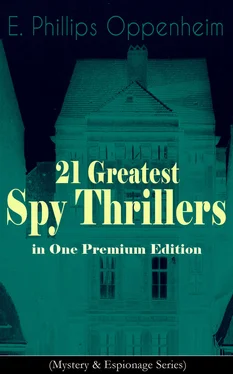“I understand, Mr. Guard, that you are willing to help my two friends and myself in a rather sad little enterprise to which we are committed,” Charles began.
“It will give me much satisfaction to be of service,” the official replied. “Often it has been my pleasure, Herr Mildenhall, to number you amongst my patrons, more especially when I conducted the Orient Express. You had diplomatic privileges and to serve you was an honour. The present occasion, I gather, is purely a private one.”
“Entirely so,” Charles admitted. “I am here to do all that I can to help my friend Mr. Marius Blute, who is a connection of the four young people who met with their deaths in a motor accident three or four days ago.”
“A sad affair,” the man sighed.
“Mr. Blute has brought their bodies down here and the relatives are almost passionately anxious that they should be taken to Switzerland. As you perhaps realize, Europe to-morrow will probably again be in a state of war. We ourselves, therefore, must pass into a neutral country.”
“The situation presents many complications,” the guard remarked dubiously.
“Not so many as you would think,” Charles insisted. “I am sure you will agree with me presently that they are all capable of solution. The eight o’clock train, which you will take charge of from here to Innsbruck and afterwards into Switzerland, is the last train to run before the closing of the frontiers. We have bespoken through Joseph a van for the four coffins, accommodations for the four guards who will travel with them and a place for three plain cases which contain the effects of the victims. These will not require to pass through the Customs in the usual way. Nothing, therefore, need be disturbed in the van at the frontier.”
“If you entrust me with the carrying out of this programme,” the official promised, “you may consider the matter arranged. The only condition is that the coffins and boxes are brought to where the van will be waiting for them on siding number seven Weltenstrasse this evening between ten and twelve o’clock. I have postponed a dinner of celebration which some friends were giving me to be there in person.”
“This gentleman here, Mr. Blute, will look after everything,” Charles said. “He will come down with the caskets himself. He will be at the place you say at the time you name. The station van, as you know, is already arranged for.”
“I have been warned of that by the authorities, sir,” the man replied. “They have admitted that the circumstance is entirely unusual, but it is undertaken at the desire of a very distinguished Englishman to whom they wish to render service.”
The official bowed to Charles. Charles returned the courtesy.
“That’s all clear, then,” the latter said. “Now comes this important question, my friend. We are causing you grave discomfort. We are inviting your leniency with regard to several restrictions, as a rule imposed by your company. We are, in short, asking you to do us a great favour. I am to ask you, on behalf of the relatives of these unfortunate people, whether you would consider the sum of two thousand reichsmarks adequate return for your personal consideration, all other expenses having been arranged with the company.”
The official once more bowed low. He also extended his hand.
“Herr Mildenhall,” he promised, “the commission which you have placed in my keeping shall be truly and faithfully carried out.”
“Capital,” Charles declared. “And here, in what we call in English the nick of time, comes our friend Frederick with the slight apéritif which we English and Americans usually permit ourselves at this hour of the day. I hope that you will join us.”
Frederick poured out the cocktails.
“A toast,” Charles proposed, bowing towards Patricia and Blute. “To our safe journey in the last train!”
Table of Contents
Charles, in accordance with the very sage advice of Marius Blute and his temporary lady secretary, Patricia Grey, descended a short time later by the crowded lift to take luncheon in the restaurant of the great, luxurious hotel. He stopped short, however, on the threshold of the American Bar. If the presence of the lady who was its sole occupant had anything to do with his hesitation, he was too late. Already the Baroness was waving her hand. He continued his progress into the room and raised her fingers to his lips.
“A divine chance!” he murmured.
“And you,” she exclaimed, and those beautiful eyes were full of reproach, “you are here in Vienna and we meet by accident!”
His moment of irresolution passed. There was not the slightest suggestion of self-consciousness about her manner. It was plain that the result of their little duel had ceased to rankle.
“Baroness,” he replied, “an accident indeed, but I am running for my life. Something tells me that it would not be healthy for an Englishman to be found in Vienna to-morrow night.”
“But you were here the night before last,” she complained. “You took your coffee with the Princess Sophie.”
“It is true,” he acknowledged. “She was gracious enough to send over a message asking me to join her for a few minutes.”
“So you remember the last time you met her?”
“I shall never forget it. You sat on my right hand. The Princess Sophie was opposite. We were the guests of that delightful man—Leopold Benjamin. You drove me home and, alas, you developed a very unfortunate curiosity about that catalogue I was carrying away.”
“You were very obstinate and very unkind,” she said. “No wonder I had completely forgotten you.”
“We are quits, then,” he remarked, “because that would have been an act of even greater unkindness.”
“There is no doubt whatever,” she acknowledged, “that for an Englishman you have a very glib tongue.”
“I have also a very susceptible heart.”
“Call it fancy.”
“Fancy is a delightful word,” he reflected, “and perhaps we do overtax that other organ a little. Am I permitted to offer you a cocktail?”
“Why not?”
Charles shivered as she selected a cherry brandy. He himself asked for a small Martini.
“You do not approve of my taste in apéritifs ?” she queried.
“Nor in my sex,” he replied. “That is to say if your luncheon companion is to be the gentleman who looked in here and disappeared a moment ago.”
“You mean Lieutenant von Hessen? He may not be a very agreeable person but he is interesting.”
“Really?”
“I mean it,” she continued. “You probably do not know that he is in the German Intelligence Department.”
“I should never have believed that he was qualified for the post if you had not told me so.”
“Stupid!” she answered, smiling. “He only asked to be presented to me because he had heard that I was an acquaintance of Leopold Benjamin’s.”
“Why on earth is everyone so interested in poor Benjamin?”
The Baroness yawned.
“Why do we talk of these foolish things after our long separation?” she murmured.
“I am not so sure that they are foolish. My time in Vienna is short. I arrived here late at night. In the morning the impulses of my civilized life assailed me. I remembered that dinner and I started out to leave my card of ceremony at the Palais Franz Josef.”
“You found no one upon whom to leave it!”
“Neither man nor house,” he replied. “I cannot say that I was surprised. If the Germans really expected that Mr. Benjamin would sit there and wait to be arrested they were very foolish. He must have known what would have been in store for him. He probably had plenty of cars and planes and he took his leave. Why are your German friends angry at that? Probably, if I were caught wandering about the streets here in a couple of days, I should be placed in a concentration camp. I should very much dislike to be placed in a concentration camp. That’s why I am hurrying home. Worse things, far worse things, might have happened to Mr. Benjamin. He might have been dropped into a fortress and it is just possible that he might never have been seen again. No, I don’t think Mr. Benjamin ought to be blamed for having hurried away.”
Читать дальше












